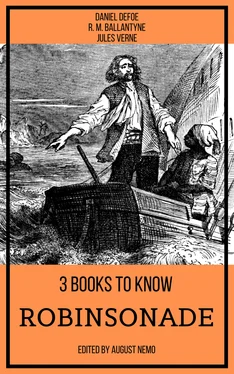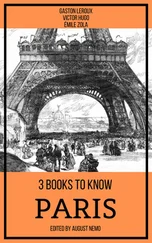That night we examined and repaired our arms ere we lay down to rest, although we were much fatigued, in order that we might be in readiness to set out on our expedition at daylight on the following morning.
PREPARE FOR A JOURNEY Round the Island — Sagacious Reflections — Mysterious Appearances and Startling Occurrences.

SCARCELY HAD THE SUN shot its first ray across the bosom of the broad Pacific when Jack sprang to his feet, and hallooing in Peterkin’s ear to awaken him, ran down the beach to take his customary dip in the sea. We did not, as was our wont, bathe that morning in our Water Garden, but in order to save time, refreshed ourselves in the shallow water just opposite the bower. Our breakfast was also despatched without loss of time, and in less than an hour afterwards all our preparations for the journey were completed.
In addition to his ordinary dress, Jack tied a belt of cocoa-nut cloth round his waist, into which he thrust the axe. I was also advised to put on a belt and carry a short cudgel or bludgeon in it, for, as Jack truly remarked, the sling would be of little use if we should chance to come to close quarters with any wild animal. As for Peterkin, notwithstanding that he carried such a long and, I must add, frightful-looking spear over his shoulder, we could not prevail on him to leave his club behind; “for,” said he, “a spear at close quarters is not worth a button.” I must say that it seemed to me that the club was, to use his own style of language, not worth a button-hole; for it was all knotted over at the head, something like the club which I remember to have observed in picture-books of Jack the Giant-killer, besides being so heavy that he required to grasp it with both hands in order to wield it at all. However, he took it with him, and in this manner we set out upon our travels.
We did not consider it necessary to carry any food with us, as we knew that wherever we went we should be certain to fall in with cocoa-nut trees — having which we were amply supplied, as Peterkin said, with meat and drink and pocket-handkerchiefs! I took the precaution, however, to put the burning-glass into my pocket lest we should want fire.
The morning was exceedingly lovely. It was one of that very still and peaceful sort which made the few noises that we heard seem to be quiet noises (I know no other way of expressing this idea)— noises which, so far from interrupting the universal tranquillity of earth, sea, and sky, rather tended to reveal to us how quiet the world round us really was. Such sounds as I refer to were the peculiar, melancholy — yet, it seemed to me, cheerful — plaint of sea-birds floating on the glassy waters or sailing in the sky; also the subdued twittering of little birds among the bushes, the faint ripples on the beach, and the solemn boom of the surf upon the distant coral reef. We felt very glad in our hearts as we walked along the sands, side by side. For my part, I felt so deeply overjoyed that I was surprised at my own sensations, and fell into a reverie upon the causes of happiness. I came to the conclusion that a state of profound peace and repose, both in regard to outward objects and within the soul, is the happiest condition in which man can be placed; for although I had many a time been most joyful and happy when engaged in bustling, energetic, active pursuits or amusements, I never found that such joy or satisfaction was so deep or so pleasant to reflect upon as that which I now experienced. And I was the more confirmed in this opinion when I observed — and, indeed, as told by himself — that Peterkin’s happiness was also very great; yet he did not express this by dancing, as was his wont, nor did he give so much as a single shout, but walked quietly between us with his eye sparkling and a joyful smile upon his countenance. My reader must not suppose that I thought all this in the clear and methodical manner in which I have set it down here. These thoughts did indeed pass through my mind; but they did so in a very confused and indefinite manner, for I was young at that time and not much given to deep reflections. Neither did I consider that the peace whereof I write is not to be found in this world — at least in its perfection — although I have since learned that, by religion, a man may attain to a very great degree of it.
I have said that Peterkin walked along the sands between us. We had two ways of walking together about our island. When we travelled through the woods we always did so in single file, as by this method we advanced with greater facility, the one treading in the other’s footsteps. In such cases Jack always took the lead, Peterkin followed, and I brought up the rear. But when we travelled along the sands, which extended almost in an unbroken line of glistening white round the island, we marched abreast, as we found this method more sociable and every way more pleasant. Jack, being the tallest, walked next the sea, and Peterkin marched between us, as by this arrangement either of us could talk to him or he to us, while if Jack and I happened to wish to converse together we could conveniently do so over Peterkin’s head. Peterkin used to say, in reference to this arrangement, that had he been as tall as either of us, our order of march might have been the same; for, as Jack often used to scold him for letting everything we said to him pass in at one ear and out at the other, his head could, of course, form no interruption to our discourse.
We were now fairly started. Half-a-mile’s walk conveyed us round a bend in the land which shut out our bower from view, and for some time we advanced at a brisk pace without speaking, though our eyes were not idle, but noted everything — in the woods, on the shore, or in the sea — that was interesting. After passing the ridge of land that formed one side of our valley — the Valley of the Wreck — we beheld another small vale lying before us in all the luxuriant loveliness of tropical vegetation. We had indeed seen it before from the mountain-top, but we had no idea that it would turn out to be so much more lovely when we were close to it. We were about to commence the exploration of this valley when Peterkin stopped us, and directed our attention to a very remarkable appearance in advance along the shore.
“What’s yon, think you?” said he, levelling his spear as if he expected an immediate attack from the object in question, though it was full half-a-mile distant.
As he spoke, there appeared a white column above the rocks, as if of steam or spray. It rose upwards to a height of several feet, and then disappeared. Had this been near the sea, we would not have been so greatly surprised, as it might in that case have been the surf, for at this part of the coast the coral reef approached so near to the island that in some parts it almost joined it. There was, therefore, no lagoon between, and the heavy surf of the ocean beat almost up to the rocks. But this white column appeared about fifty yards inland. The rocks at the place were rugged, and they stretched across the sandy beach into the sea. Scarce had we ceased expressing our surprise at this sight when another column flew upwards for a few seconds, not far from the spot where the first had been seen, and disappeared; and so, at long, irregular intervals, these strange sights recurred. We were now quite sure that the columns were watery, or composed of spray; but what caused them we could not guess, so we determined to go and see.
In a few minutes we gained the spot, which was very rugged and precipitous, and, moreover, quite damp with the falling of the spray. We had much ado to pass over dry-shod. The ground, also, was full of holes here and there. Now, while we stood anxiously waiting for the reappearance of these waterspouts, we heard a low, rumbling sound near us, which quickly increased to a gurgling and hissing noise, and a moment afterwards a thick spout of water burst upwards from a hole in the rock and spouted into the air with much violence, and so close to where Jack and I were standing that it nearly touched us. We sprang aside, but not before a cloud of spray descended and drenched us both to the skin.
Читать дальше













